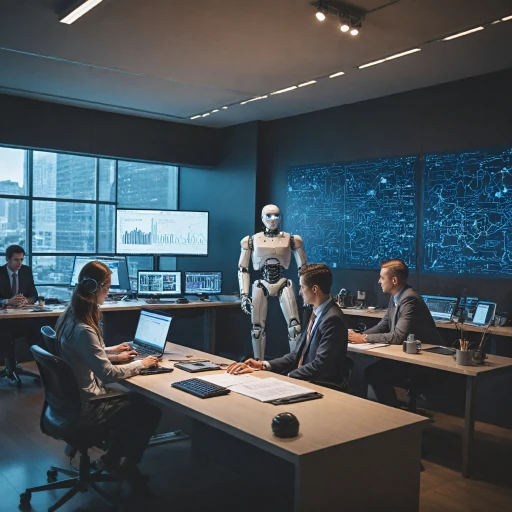AI-Powered Talent Acquisition: Finding the Right Fit
Unleashing AI for Optimal Talent Acquisition
In today’s business environment, utilizing artificial intelligence for talent acquisition has become a game-changer for HR professionals. According to a Gartner report, 47% of HR departments in the United States employ some form of AI in their recruitment process. The integration of AI tools helps in analyzing vast amounts of data quickly, which would otherwise be incredibly time-consuming for human recruiters.
AI-Powered Candidate Screening
AI technology, especially those powered by machine learning algorithms, can sift through thousands of resumes in mere moments. As per IBM’s HR division, this technology has shortened their hiring process by 50%. By using natural language processing, AI can understand and evaluate job descriptions against candidate profiles, ensuring a higher match rate. This high level of efficiency not only speeds up the recruitment process but considerably enhances the quality of hire.
Data-Driven Insights for Improved Decision Making
“Hiring should be based on intelligence and clear-cut data analysis, not gut feeling,” says Josh Bersin, a renowned HR industry analyst. AI tools provide HR teams with data-driven insights, enabling better decision making. These insights ensure that the decision to hire an employee is objective and based on the candidate’s real fitting potential within the company’s culture. Such informed decisions minimize the risk of bad hires and improve employee engagement in the long run.
Streamlining Talent Pools
Building and managing talent pools manually can be overwhelming. However, AI has revolutionized this process by continuously learning and updating candidate profiles based on new data. According to a study by McKinsey, organizations leveraging AI for talent pool management have improved their talent pool’s relevance by 40%. AI keeps track of potential candidates’ skills, experiences, and career progressions, ensuring an engaged and ready-to-hire pool whenever needed.
Removing Unconscious Bias
Unconscious bias during recruitment is a significant challenge. AI solutions, when implemented correctly, can help reduce this bias. They evaluate only the data points and do not make judgments based on irrelevant criteria. Amazon’s HR division experienced a remarkable improvement in diversity hiring metrics after integrating AI tools that focused solely on qualifications and skills rather than names or backgrounds.
Case Study: Unilever’s AI Transformation
An interesting example is Unilever’s adoption of an AI-powered recruitment tool that scans applicants’ video interviews for their facial expressions, word choice, and speech patterns. Results from Unilever’s pilot program point to a 16% increase in applicant satisfaction and a 25% reduction in recruiter workload.
In the next section, we will discuss how AI can enhance the employee experience through personalized AI solutions. Stay tuned!
Enhancing Employee Experience Through Personalized AI
Personalized AI for Employee Experience
Did you know that AI can significantly enhance the employee experience within an organization? According to a report by Gartner, organizations that implement AI-driven personalization see a 30% increase in employee engagement. By using intelligent tools, companies can tailor experiences that resonate with individual employees, right from onboarding to career development. Let's see how this can be done.
Enhancing Onboarding Processes
Starting a new job can be overwhelming, but AI can alleviate some of that stress. For instance, IBM uses a chatbot named Watson that guides new hires through their first few days. This chatbot answers questions, offers useful resources, and provides a friendly interface for new employees. Such initiatives make an employee feel welcomed and supported, right from day one.
Creating a Feedback Loop
AI tools can also create feedback loops that actively shape employee experiences. By using predictive analytics, employers can proactively address employee concerns and improve job satisfaction. Josh Bersin, a global HR analyst, emphasizes that AI enables HR departments to run 'pulse surveys' to detect and resolve issues before they escalate. This ongoing communication keeps the workforce engaged and valued.
Personalized Career Development
Artificial intelligence supports career development by offering tailored learning paths. Platforms like Cornerstone OnDemand use machine learning to recommend courses and projects based on an employee's career aspirations and performance metrics. These personalized learning experiences not only enhance skill sets but also prepare employees for future roles within the company.
AI Tools for Employee Wellness
AI also plays a crucial role in promoting employee wellness. Platforms like Virgin Pulse use data analytics to provide personalized health and wellness plans. This approach not only improves the physical well-being of employees but also enhances their productivity and morale. The McKinsey Global Institute found that companies investing in employee wellness programs see up to a 25% reduction in healthcare costs.
Leveraging AI for Remote Work
In the era of increased remote work, AI helps to maintain a cohesive work environment. Tools like Microsoft Teams use AI to schedule meetings, manage tasks, and even track productivity. This seamless integration ensures that remote employees remain connected and engaged, thus enhancing their overall experience.
Real-Life Example: SAP's Success Story
SAP, a globally renowned enterprise software company, has successfully used AI to boost employee engagement. By employing AI-driven tools for personalized learning and development, SAP has reported a 20% increase in employee retention rates. Their initiative demonstrates the tangible benefits of AI in enhancing the employee experience.
Addressing Data Privacy Concerns
Despite the advantages, the use of AI in HR also raises data privacy concerns. A study by the SHRM (Society for Human Resource Management) reveals that 60% of employees are worried about how their personal data is used. To address this, companies must be transparent about their data policies and ensure robust security measures are in place. Ensuring that AI tools comply with regulations like the GDPR (General Data Protection Regulation) in Europe is crucial for maintaining trust.
Case Study: Amazon's AI-Driven HR
Amazon has incorporated AI in its HR processes, from talent acquisition to employee engagement. By using natural language processing and machine learning, Amazon's AI systems analyze employee sentiments and provide actionable insights. Despite some controversies related to data usage, Amazon continues to refine its AI applications to enhance the employee experience.
The world of work is changing rapidly, and AI is at the forefront of this transformation. Though it comes with its challenges, the potential benefits of personalized AI in improving employee experience are immense, making it a worthy consideration for any forward-thinking organization.
For more insights on how AI is transforming various business aspects, check out this article on the strategic importance of mobile and wireless technology.
Data-Driven Decision Making in HR Management
Harnessing Data for Strategic HR Decisions
Incorporating AI into HR data analysis offers a wealth of information, previously unimaginable, that can drive strategic decisions. According to SHRM, 70% of companies invested in HR technology to stay competitive in the market. McKinsey & Company states that data-driven organizations are 23 times more likely to acquire customers and 19 times more likely to be profitable. Clearly, data isn't just numbers—it's a goldmine for strategic management.
Personalizing Employee Journeys with AI Insights
AI provides a tailored experience for employees, enhancing engagement and satisfaction. With tools like IBM Watson, HR professionals can now predict and personalize employee experiences, tailoring development programs to individual needs. Josh Bersin mentions that companies that leverage AI for performance management see a 3-5% increase in employee productivity. Personalized learning paths also foster a sense of growth and offer strategic insights into business success.
Driving Efficiency in Performance Management
AI-powered systems can remove biases and errors in performance evaluations, leading to fairer assessments and targeted improvements. According to Gartner, 58% of organizations report using AI for performance management. A case study from Amazon highlights how AI tools helped identify skill gaps and optimize workforce allocation, ultimately improving business outcomes. This shift towards data-driven decisions is pivotal in making timely adjustments and ensuring consistent employee management.
Leveraging Data for Employee Experience
Data analytics allow HR teams to comprehend employee sentiments and engagement levels accurately. For example, SAP leverages AI to perform sentiment analysis on employee feedback, offering actionable insights for improved workplace culture. According to a Marsh & McLennan report, businesses utilizing AI-driven feedback tools see a 21% increase in employee engagement rates.
The Power of Predictive Analytics in HR
Predictive analytics can foresee future trends and challenges, allowing companies to prepare effectively. McKinsey Global Publishing indicates that predictive models help HR departments reduce turnover by identifying risk factors early. Furthermore, a report from Gartner suggests that AI-based predictive analytics can save companies in the U.S. up to $1.2 trillion annually by optimizing talent acquisition and management processes.
Improving Performance Management with AI Insights
Using AI for Real-Time Performance Feedback
Real-time feedback is a game-changer in the modern workplace. AI tools enable managers to provide immediate input on employee performance, nurturing a culture of continuous improvement. A survey by LinkedIn found that 92% of employees prefer receiving feedback more frequently than the traditional annual or semi-annual reviews.
AI-Driven Performance Metrics
Employing machine learning algorithms, companies can now analyze employee data to derive meaningful performance metrics. Consider IBM’s Watson, which applies natural language processing to sift through heaps of data, offering insights previously difficult to uncover. This data-driven approach ensures that performance reviews are not only comprehensive but also unbiased.
Enhancing Employee Development with AI Insights
AI helps HR professionals identify skill gaps and training needs. As mentioned by Josh Bersin, a leading industry analyst, “AI is pivotal in pinpointing employee strengths and areas for development without the manual labor traditionally required”. Whether it’s IBM’s learning platform or SAP’s SuccessFactors, AI enhances the employee learning experience, making professional growth a priority.
Boosting Employee Engagement
A McKinsey report indicates that companies utilizing AI to manage performance see a 20% increase in employee engagement. By offering personalized feedback and development plans, AI ensures employees feel valued and understand their career progression, leading to a considerable boost in morale.
AI in Performance Reviews
Regular performance reviews transformed by AI provide actionable insights that drive employee performance. A study by Gartner suggests that companies leveraging AI for performance management report a 40% improvement in overall workforce productivity.
The Takeaway on AI in Performance Management
As HR teams in the United States, Europe, and beyond increasingly adopt artificial intelligence, the benefits for performance management are undeniable. The investment in AI not only enriches the employee experience but also empowers HR professionals to make informed, data-driven decisions. Embrace AI in performance management to stay ahead of the curve and ensure your business thrives in the evolving digital age.
AI in Talent Management: Beyond Recruitment
AI's Role in Enhancing Talent Development
When you think about AI in talent management, your mind might jump straight to recruitment. But there's a whole other world where AI redefines how we nurture and develop talent within an organization.
According to a McKinsey report, 56% of companies are already using AI for talent management beyond hiring, proving its pivotal role in the sector. AI's ability to track and analyze employee performance in real-time is no small feat, altering how we think about skill development and career progression.
Real-Time Performance Analytics
AI-powered tools like those offered by IBM's Watson are being leveraged to improve performance management. By collecting continuous feedback and performance data, these tools provide employees with personalized insights on how they can improve their skills.
Consider a marketing firm in New York City using AI to track key performance indicators (KPIs). The software monitors each employee's work and provides data-driven suggestions for upskilling. This not only helps employees grow but also supports HR in making informed decisions about promotions and bonuses. Real numbers back this up: a Training Magazine case study found that companies using AI report a 26% increase in employee productivity.
Personalized Learning and Development Paths
Another fascinating aspect of AI in talent management is its ability to personalize learning and development (L&D) programs. By analyzing an employee's skillset and career goals, AI can recommend specific courses or training modules. For example, Amazon uses machine learning algorithms to tailor training programs to each employee's needs, ensuring they gain the skills required for their roles. This not only secures employee engagement but also retention.
According to Deloitte, 83% of companies that utilize AI for L&D see a noticeable improvement in employee engagement. Employees are more likely to stay with companies that invest in their growth, reducing turnover rates and strengthening the workforce.
Boosting Employee Morale with AI
AI also plays a crucial role in boosting employee morale. Tools like chatbots serve as virtual HR assistants, handling time-consuming tasks like scheduling and answering routine queries. This allows HR professionals to focus on more strategic initiatives.
Take the example of SAP's SuccessFactors, used by many organizations worldwide, including Europe and the U.S. These AI-driven systems offer a seamless employee experience by managing tasks efficiently. Employees no longer have to wait days for HR to respond to simple questions, improving overall job satisfaction.
AI-Driven Predictive Analytics
AI's predictive analytics can forecast future workforce needs, helping HR teams in strategic planning. For instance, Marsh McLennan employs AI to predict when employees might be looking to move elsewhere, allowing HR to intervene proactively.
Moreover, AI-driven insights into workforce trends support proactive talent management strategies. Companies like SHRM have reported that predictive analytics can improve retention rates by up to 20%, making it a game-changer in the HR field.
What Experts Say
Josh Bersin, a renowned HR analyst, emphasizes the importance of embracing technology in talent management. He states, "AI and machine learning are not just buzzwords. They are the future of human resources, helping leaders drive informed decisions and create a more engaged workforce."
In short, AI's role in talent management extends well beyond recruitment. From personalized development paths to real-time performance analytics, it offers HR teams powerful tools to enhance talent development and employee engagement. As organizations continue to integrate AI, the potential for transforming human resources remains boundless.
The Role of Machine Learning in Learning and Development
Powering Skill Development with Machine Learning
Machine learning (ML) is revolutionizing how businesses approach learning and development (L&D). By analyzing vast amounts of employee data, ML algorithms can identify the specific skill sets required for various roles. This data-driven approach enables HR professionals to tailor training programs that address individual needs, significantly boosting engagement and retention rates.
Creating Personalized Learning Paths
One of the significant advantages of ML in L&D is creating personalized learning experiences. According to McKinsey, personalized learning can improve employee performance by up to 20%. Through adaptive learning algorithms, the system determines the most effective way for each employee to learn, whether it’s through video tutorials, interactive modules, or hands-on training sessions.
Real-Time Feedback and Continuous Improvement
Leveraging machine learning for real-time feedback is becoming increasingly vital. IBM’s Smarter Workforce Institute reports that employees are 2.6 times more likely to be engaged when they receive continuous feedback. Tools powered by ML algorithms provide actionable insights, allowing managers to offer timely, constructive feedback. This continuous loop not only improves immediate performance but also aids in long-term career development.
AI-Driven Learning Platforms
Companies like SAP and Amazon are already harnessing AI-driven platforms to enhance their L&D initiatives. For example, Amazon's AWS Educate program uses machine learning to tailor content for different employee levels, from entry-level associates to senior engineers. This approach not only ensures relevant training but also saves time and resources. According to a 2022 Gartner report, enterprises that use AI-driven learning platforms have seen a 30% increase in skill acquisition rates.
Case Study: SAP’s Success with AI in L&D
Consider the case of SAP. The company implemented an AI-driven learning and development platform aimed at enhancing employee skills in emerging technologies. Within six months, SAP reported a 40% decrease in time taken for employees to become proficient in new skills, alongside a 35% increase in employee satisfaction regarding L&D programs. This initiative demonstrates how AI and ML can transform traditional training programs into efficient, employee-centric models.
Expert Insights on ML and L&D
Josh Bersin, a renowned HR analyst, emphasizes the untapped potential in using ML for learning and development. He states, “Machine learning is not just a tool for automation; it’s a way to create a more personalized, engaging, and effective learning experience.” Bersin's insights mirror the trends observed globally—AI and ML are set to redefine how organizations approach employee development.
Addressing Controversies: AI in HR
AI Bias: A Double-Edged Sword
When it comes to integrating artificial intelligence in human resources management, bias remains a notable controversy. AI systems learn from data, and if that data is inherently biased, AI can perpetuate and even amplify those biases. According to Harvard Business Review, around 49% of HR professionals express concern over AI bias in HR tools. Notable experts such as Josh Bersin have highlighted the critical need to audit AI systems regularly to ensure fairness and transparency.
Privacy Concerns: Balancing Efficiency and Employee Rights
The rise of AI in HR brings along increased scrutiny regarding employee privacy. From monitoring workplace behavior to analyzing personal data for performance management, these practices often blend into privacy invasion territory. A study by SHRM indicated that 42% of employees in the United States feel uncomfortable with AI-driven employee monitoring. Balancing efficiency with employees' rights remains an ongoing challenge.
Ethical Dilemmas: AI's Role in Decision Making
Decision making in HR management is significantly impacted by AI, but this raises ethical concerns. Automating critical decisions like hiring and layoffs can feel impersonal and unjust. A report from Gartner highlights that 37% of businesses adopt a human-centric approach to mitigate the risks associated with AI-driven decisions. Ensuring that human oversight complements AI can help in preserving fairness and empathy in the workplace.
Resistance to Change: The Human Factor
AI adoption in HR faces resistance from within the workforce. Professionals often fear that artificial intelligence might replace employees, particularly in talent acquisition and performance management. However, studies by McKinsey Global Publishing suggest that AI should be viewed as a tool to augment HR tasks rather than replace human input. As companies navigate this transition, transparent communication about AI's supportive role can ease anxiety.
Case Study: Amazon's AI Hiring Tool
A great example of the controversies surrounding AI in HR is Amazon's AI hiring tool, which the company scrapped after it was found to be biased against women. According to Reuters, the tool downgraded resumes mentioning the word 'women' and preferred male candidates for technical roles. This case underlines the importance of constantly refining AI algorithms to eliminate bias and promote equality.
Striking the Right Balance
As companies like IBM and SAP dive deeper into AI integration in HR, the challenge lies in balancing efficiency with ethical considerations. Companies must remain vigilant against biases, protect employee data, and ensure that AI enhances the human experience without replacing it.
Future-Ready Workforce: Preparing for AI Integration
The New Age of Job Descriptions and Talent Acquisition
In the evolving world of AI in HR, job descriptions are undergoing a sea change. AI tools are simplifying this once time-consuming task, converting it into a data-driven process. According to a study by Gartner, companies using AI in talent acquisition report a 70% reduction in time to hire. Machine learning algorithms analyze vast amounts of data to identify the skills and attributes that correlate with high performance, making job descriptions more precise and effective.
Skills Mapping: Building a Future-Ready Workforce
No more guesswork. AI-driven skills mapping is helping HR professionals prepare employees for the future. With predictive analytics, companies can forecast the skills they will need down the road and invest in learning and development programs accordingly. For example, IBM has been using AI to identify skill gaps among its workforce, resulting in a 20% improvement in employee performance.
Personalized Employee Experiences: AI’s Human Touch
AI isn’t just about cold, hard data. It’s about enhancing the employee experience in a deeply human-centric way. Machine learning can tailor development programs to individual needs, turning one-size-fits-all training into personalized learning journeys. This increases employee engagement and aligns personal goals with business objectives.
AI in Performance Management: Data-Driven Insights
Performance reviews can often be subjective and biased. Enter AI. By analyzing data points like productivity metrics, feedback, and peer reviews, AI provides unbiased, data-driven insights that help managers make informed decisions. Companies like Amazon are setting the trend, utilizing AI in performance management to drive efficiency and fairness, ensuring that talent management goes beyond the recruitment phase.
Controversies and Ethical Considerations
With great power comes great responsibility. AI is not without its controversies, especially concerning bias and privacy. A report by SHRM notes that 60% of HR professionals express concern about AI in decision-making processes. It’s crucial for companies to adopt ethical guidelines and transparency to avoid perpetuating biases and ensure that data used by AI systems is secure and anonymized.
The Global Perspective: AI Integration in Different Regions
The adoption of AI in HR varies across the globe. In the U.S., companies are rapidly embracing AI technologies. According to McKinsey, around 30% of U.S. companies have integrated AI into their HR practices. Meanwhile, Europe is catching up with a focus on regulation and ethical use. The European Union's stringent data privacy laws are pushing for more responsible use of AI systems in HR.














